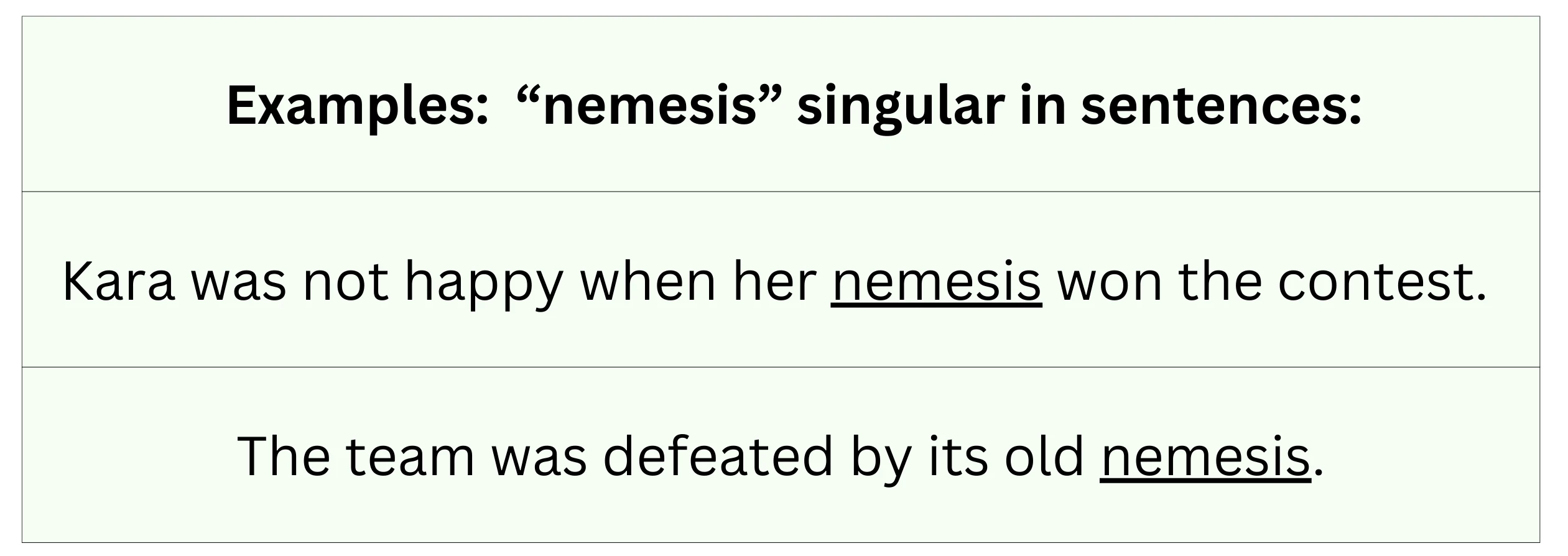What’s the plural of “nemesis”?
The correct plural of nemesis is nemeses. For the rest of you (nerds) that want to dig deeper, and get a little more … textual: what’s up with the word nemesis, and why does it behave the way it does from its singular to plural form? Keep reading.
The villain in the story became the hero’s ultimate nemesis.
The characters in the series had to face several powerful nemeses.
The politician struggled against his many nemesis.
The twin brothers were each other’s greatest nemesises.
What does nemesis mean?
Merriam-Webster (shoutout to Noah Webster) defines the word nemesis as “one that inflicts retribution or vengeance.” Another understanding of the word nemesis is as a “formidable and usually victorious rival or opponent.”
What’s the plural of nemesis?

Many confuse the plural of nemesis, and it’s not tough to see why: nemesis is an irregular plural. Nemesis plural is nemeses, and this is strange for us English language speakers and learners to grasp. Plural nouns in English typically end in -s or -es; this is the regular plural noun form in English:

The plural of “nemesis,” associate it with other words ending in “-sis” that form their plurals by changing to “-ses,” like “analysis” becomes “analyses.”.
Words that end in -sis
Nemesis plural does end in –es, i.e., nemeses. Still, nemeses is an irregular plural: -es replaces the -is in its singular noun form, and so effectively changes the spelling of the entire word. See from the chart above of regular plural nouns how an -s is added to denote a plural. The –s does not step in the place of the integral spelling of the noun.
Still, nemesis/nemeses are not alone: diagnosis, analysis, synthesis, thesis, and thesis all end in -sis as singular nouns. Accordingly, each also mimics the same plural form (i.e., substitutes -sis with -ses as a suffix.) Nemeses, diagnoses, analyses, oases, theses all share the same structure in both singular and plural forms.
| singular | plural |
| nemesis | nemeses |
| crisis | crises |
| diagnosis | diagnoses |
| oasis | oases |
| synopsis | synopses |
| thesis | theses |
Aside from being irregular plural nouns, these words all have another thing in common: they’re all Greek. Though you think Greek may occupy a large portion of the English language, it in fact only takes up about 5% of the English language. Most English words come from the Germanic languages, which includes Dutch, German; Old Norse; Old Frisian, and a few others.
Words like nemesis, crisis, analysis and the like have all conserved their original Greek form in both the singular and plural forms. That’s pretty incredible, and means that we all actually speak a little bit Greek!
Examples of nemesis used in context
The following sentences show the correct use of the word nemesis in context:
1. He will be playing his old nemesis for the championship.
2. He was a powerful nemesis that continued to take on a number of forms and becomes more powerful with each one.
3. Kara was not happy when her nemesis won the contest.
4. Frank has been a nemesis to House Speaker Newt Gingrich.
5. My nemesis was determined to ruin my chance for promotion at work.
Examples of nemeses in context:
The following sentences show the correct use of the word nemeses in context. Sentence examples of nemeses are borrowed from Collin’s Dictionary, nemeses:
1. Free radicals are nemeses we all have to deal with, whether we’re aware of them or not.
2. Ireland’s first win in eight attempts against their traditional nemeses. (Times, Sunday Times (2010)
3. Yesterday’s battle of the nemeses spluttered and flickered but, alas, never caught fire.
4. It is a force for good; consumerism and contemporary politics are its nemeses.
5. And we talk about his professional nemeses.
Synonyms of nemesis
- vigilante
- avenger
- mess
- punisher
- chastiser
- righter
- scourge
- redresser
- castigator
What’s the difference between they’re, their, and there?
Work Sheet
According to the blog post, what is the correct plural form of “nemesis”?
The blog post notes that the plural of “nemesis” is formed by:
The post states that “nemesis” is an example of what type of plural form?
Which of the following words, mentioned in the post, forms its plural similarly to “nemesis”?
According to the post, what is a common incorrect pluralization of “nemesis”?
The characters in the series had to face several powerful .
Words like nemesis, crisis, and diagnosis form their plurals by changing the ending -sis to .
The blog post uses the sentence “The villain in the story became the hero’s ultimate .” as a correct example of using the singular noun.
The post notes that words like nemesis, crisis, and analysis share a structural similarity in forming their plurals and originated from the language.
The politician struggled against his many . (Complete the sentence using the correct plural form mentioned in the post).
Frequently Asked Questions
What’s the plural of nemesis?
+
Why is nemeses an irregular plural?
+
What words pluralize like nemesis?
+
What does nemesis mean?
+
How do you use nemesis and nemeses?
+
Yash, D. "What’s the Plural of Nemesis?." Grammarflex, Jun 6, 2025, https://www.grammarflex.com/whats-the-plural-of-nemesis/.
Sources
-
Example sentences nemesis/nemeses from Collin’s Dictionary











